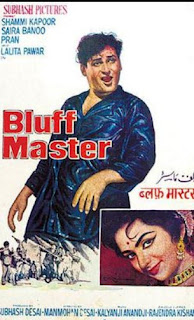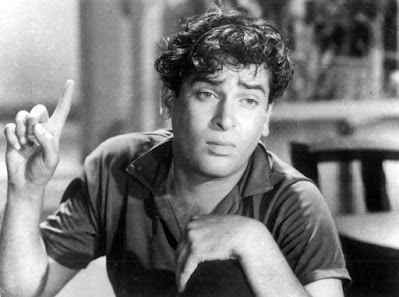 |
|
Directed by Manmohan Desai Music: Kalyanji-Anandji Lyrics: Rajinder Krishan Starring: Shammi Kapoor, Saira Banu Pran, Lalita Pawar, Tuntun, Rashid Khan, Mohan Choti |
Manmohan Desai made his name selling the most illogical stories wrapped up in emotion to a wide-eyed audience. But before he reached his full powers of over-the-top farce, he made a couple of films where he wove the stories of ordinary people, coloured them with the palette of emotions, and served up films that were a potent blend of romance, comedy, drama and action. Bluffmaster, which repeated the Shammi Kapoor-Saira Banu pairing, was one of them.
The whole movie is based on the premise that one can fool some of the people all the time and all the people some of the time – but can never fool all the people all the time. So we are introduced to Ashok (Shammi Kapoor), who lives in a chawl, and spins yarns to earn a living. If he is selling fake lottery tickets to his ‘sister’ (Tuntun), he’s selling Bryl Crème as an ayurvedic oil to a wanna-be wrestler to help him achieve his dreams.
He lies, cons and cheats his way through life, using his charm and conversational skills to keep everyone guessing. He hopes to send money home to his mother (Lalita Pawar), an upright, sensible woman, who doesn’t suspect that her son is conning her as well.
One day, he comes across an advertisement for a newspaper reporter’s job – after stealing a camera and faking his résumé, he lands himself the job. His big ‘scoop’ is the photograph of a pretty woman (Saira Banu) slapping a roadside Romeo.
The editor is very pleased, the paper’s (named Bhukamp [earthquake] circulation skyrockets, the owner Jwala Prasad (Niranjan Sharma) asks to meet this new hotshot reporter.
When Ashok meets him, Jwala Prasad is pleased to offer him a raise. But the very next moment, Seema erupts into the room. She was the young woman who accosted the eve-teaser, it’s her photo in their newspaper. She fires Ashok on the spot.
It turns out that Jwala Prasad is not the owner of the newspaper – or any of the property. It belonged to Seema’s father, and he’s managing it for her until she comes of age. Enter Ram Kumar (Pran), who upon being asked why he had returned to India, quips that Jwala Prasad had stopped sending him the money to live abroad. It is clear that Jwala Prasad is being blackmailed by him, but one sight of Seema and Ram is smitten. If Seema were to be his, he implies, then the blackmail would stop.
Seema has no time to stop and listen to his compliments. She is putting on a show for charity but is taken aback when her star attraction – a famous dancer named Munni bai – backs out at the last moment. Ashok, who seems to land up everywhere, offers to lend a helping hand – provided she a) takes part in the show and, b) reinstates him. With no other option, Seema agrees. And we are treated to a rather decent qawwali. (And Shammi in drag.)
Back in the village, Ashok’s mother requests the mailman to read her son’s letter to her. It is clear from the letter that he’s conning her, but she’s a simple woman who is pleased that her son is a reporter, which the mailman interprets as the ‘government’s brother’.
Meanwhile, a desperate Jwala Prasad informs Seema that it was her father’s dying wish that she marry Ram. Seema, who is not very predisposed to like Ram, demurs, but her uncle’s story unsettles her. She begs Ashok to help her. Soon, they are traipsing all over the countryside, Ram in tow, but inexplicably, Ashok and Seema always seem to disappear while Ram is left to pay for their jaunts.
An incensed Ram tells Jwala Prasad that he had better school his niece. Meanwhile, Ashok has really fallen in love with Seema. Only, as is his wont, he has lied to her as well – he tells her that his father is a wealthy businessman in Calcutta, and that his father will definitely visit her uncle to ask for her hand in marriage.
Alas for best laid plans – Ashok’s mother, whose house is the villagers’ bank, wakes up one morning to find her house burgled, and their money stolen. Suspected by the villagers of having stolen the money herself, the self-respecting woman decides to travel to Bombay to ask her son for the money to repay her neighbours. Unfortunately for Ashok, she lands up at the Taj Mahal Hotel – where he had told her he stayed, and runs into Ram, who works there.
Ram was looking for just such an opportunity to sideline Ashok. So just when Jwala Prasad is meeting Ashok disguised as his own father, in walks Ram with Ashok’s mother.Ashok is devastated, his mother is appalled, Seema is heartbroken. Will his mother forgive Ashok? Will Seema? And just what is Ram’s hold on Jwala Prasad?
I was pleasantly surprised by this film (I’m not saying it’s a great film) and by Shammi himself. (And unpleasantly surprised at the songs – apart from a couple of the songs, Kalyanji-Anandji’s score is certainly not worthy of a Shammi Kapoor film.)
While the film itself was not earth shatteringly original – this is Manmohan Desai we are talking about – Shammi imbued his character with both rakish charm and sensitivity. His eyes reflected both his hurt and his repentance. The arc allowed him the freedom to perform, and he turned in a very nuanced portrayal of a wayward man who chooses the easy path to earn money who is forced by circumstances to take stock of his life.
Saira Banu is not
one of my favourite actresses. [How beautiful is she, though!] But, as in Junglee, here, too, she turns
in a restrained performance as the independent-minded, sensible Seema. She
doesn’t take any nonsense from Ashok but is also compassionate and
understanding when called upon to be so. And Shammi and she do share a decent on-screen chemistry.
The plot is not as convoluted as later Man movies and is not cluttered by unnecessary comic side plots. What’s more, TunTun is not fat-shamed. That must be a first. All in all, this is not one of the films that you think of when you remember Shammi Kapoor, but it is relatively entertaining.
---------------------------------------------------------------------------------------------------------------
UPDATES - Mumu Shelley
I have just received news about the screening of Mumu Shelley online. It's playing on Eventscape until 31 January 2022, and can be viewed for the nominal amount of Rs99 (India) or USD 2 (US). Eventscape, in collaboration with StoryMirror, is also organising a story contest which encourages viewers to submit alternate endings to the movie. I encourage my readers to explore this film and support Indie films and filmmakers. For my review of the film, click here.














No comments:
Post a Comment